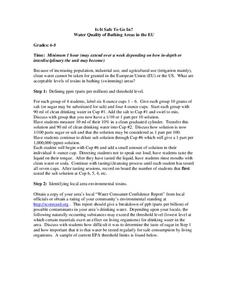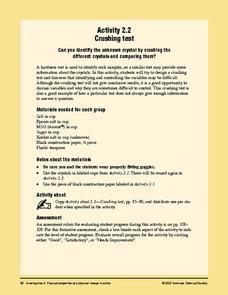Cornell University
Energy Changes in Chemical Reactions
The heat of solution measures how much thermal energy a dissolving substance consumes or gives off. The experiment demonstrates both endothermic and exothermic reactions. Scholars dissolve several substances, measure the temperature...
Curated OER
Osmosis and Dialysis
How do you engage pupils in a discussion about osmosis without leaving them overwhelmed? By providing them with the tools to perform an exciting experiment, and they will see osmosis in action! Young chemists and biologists use a potato...
Beyond Benign
Daphnia Bioassay LD50
De-icing materials may have a harmful effect on our environment; have your class perform an experiment to test the nature of these effects. Scholars monitor the survival rate of a sample of daphnia as the concentration of a de-icing...
SeaWorld
Animal Husbandry
Learners study how changes in the environment can drastically affect the survival of an animal. After a class discussion, pupils are divided up into groups and are given the task of coming up with the best environment to allow brine...
Curated OER
Is It Safe to Go In? Water Quality of Bathing Areas in the EU
Using your senses, apprehend the effects of contaminants in water. With a global focus, young scientists conduct a safe experiment by tasting sugar and salt water with different dilutions. After reviewing threshold limits, learners write...
Cooking Matters
Happy Whole-idays
Take a look into how whole grains support growth, provide energy to play, and help us to stay strong with a fun-filled resource. The worksheet offers interesting food facts, an exercise in nutrition label reading, a recipe for chunky...
Curated OER
Christopher Columbus
This is a nicely done presentation on the voyages of Christopher Columbus. Most young historians don't realize that Columbus made, not one, but four journeys from Spain across the Atlantic Ocean to the New World. This PowerPoint does a...
Curated OER
How Does Water Cool?
How fast does water cool? First fifth graders will draw a line on a graph that predicts how fast they think water can cool from boiling. Then they plot the actual data on the same graph to see if their estimate was correct.
Polar Trec
South Pole Ice Cream!
How can you turn an ice cream activity into a scientific investigation? It's easy if you know ionic compounds, heat transfer, and the exothermic and endothermic process. Learners will explore the science behind freezing, insulation, and...
Curated OER
Penny Science
A penny can be a much more valuable teaching tool that you might think. Whether you are teaching about chemical reactions, surface tension, the behavior of gases, or are just looking for engaging activities for early finishers, this...
Virginia Department of Education
Soap, Slime, and Creative Chromatography
Do you think chromatography paper suffers from separation anxiety? Young chemists make soap, slime, silly putty, and experiment with chromatography in this instructional activity. The material includes clear instructions for each...
NOAA
Ocean Layers II
Now that you know the ocean has layers, let's name them. The seventh installment of a 23-part NOAA Enrichment in Marine sciences and Oceanography (NEMO) program covers terminology associated with ocean layers, such as thermocline and...
National Institute of Open Schooling
Ionic Equilibrium
Scientific studies show the older we get, the more acidic we become. The activity extensively teaches high schoolers about acids and bases. By the end of the 14th installment of 36, they can define and explain three concepts of...
Curated OER
Properties of Fresh and Sea Water
Students work with three stations to demonstrate the properties of water. They explore water's boiling point, freezing point, and its ability to store heat.
Curated OER
Scientific Method Experiment: Factors Affecting How Ice Melts
Students demonstrate the scientific method by conducting an ice cube melting experiment. They make predictions and observations, and conclude what factors make ice melt more slowly or quickly than normal.
Curated OER
Condensation Polymerization: Preparation of Nylon 6/6
Students participate in a lab activity in which they synthesize nylon 6/6, calculate the percent yield by mass, identify the polymer as thermoplastic or thermoset, and determine the melting point, density and end-product use of the polymer.
Curated OER
Ice Cream: a Taste of Science!!
High schoolers define the term solution. They explain conservation of energy and energy transfer as it relate to how the milk solution became ice cream. Students are able to explain freezing point depression.
Curated OER
What Are The Properties of Sea Water?
Ninth graders conduct research on the subject of sea water. They use a variety of resources to obtain information. There are helpful resource links listed in the lesson. In conjunction with the research students make inquiry of the...
Curated OER
5th grade science review
In this science review worksheet, 5th graders answer questions about molecules, force, elements, nature, and more. Students complete 25 multiple choice questions.
Curated OER
Regulating the Internal Environment
This presentation begins with the many problems multicellular organisms which rely on diffusion encounter. There are many diagrams of mammalian organ structures, and they are labelled with their relevant functions. This an excellent...
Curated OER
Kidney Structure and Function: removing intracellular waste
Your class will learn all about the function of the kidney and how it operates in animals from different habitats. The methods of absorption, filtering and excretion are detailed and pupils will learn of the different disposal methods...
Curated OER
Distillation
A sequence of slides that show the apparatus set up for varying practices of distillation. The equipment pieces in each diagram are labeled and their purpose noted. Your class can use these pictures to help set up their own equipment, or...
K12 Reader
Water Water Everywhere
The protection of our water supply is the subject of an article used in this cross-curricular reading comprehension worksheet. After studying the passage, readers use information from the text to respond to a series of comprehension...
American Chemical Society
Crushing Test
Solidify understanding of the properties of crystals by crushing them to compare hardness. After some class discussion, a procedure is planned, and then small groups go about making observations as they crush five different crystal...
Other popular searches
- Salt Dough Map
- Salt Water
- Salt Marshes
- Salty Oceans
- Gold and Salt Trade
- Great Salt Lake
- Epsom Salt
- Salt Water Chemistry
- Fresh Water Salt Water
- Mahatma Gandhi Salt March
- Growing Salt Crystals
- Freshwater and Saltwater

























